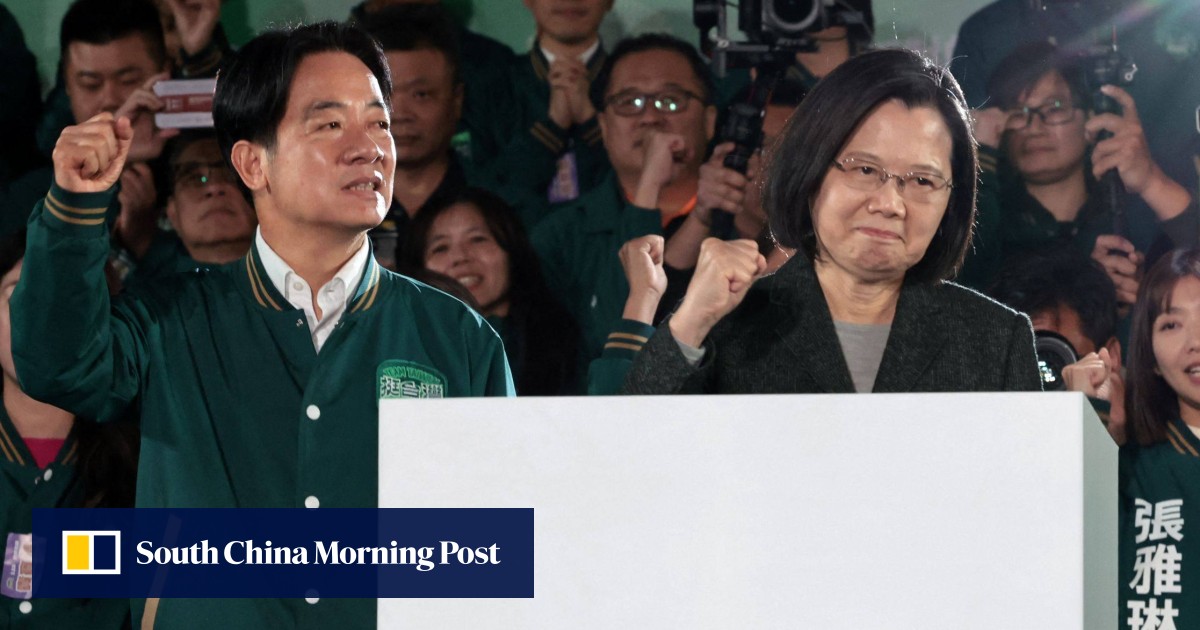Taiwan election: Lai’s victory risks further tensions with Beijing
Taiwan election: Lai’s victory risks further tensions with Beijing
Observers said Tsai’s handling of cross-strait relations was the primary source of the risk of conflict, though some pundits said she was not the only one to blame.
James Yifan Chen, a professor of diplomacy and international relations at Tamkang University in New Taipei, said cross-strait tensions continued to rise after Tsai became the island’s leader, with Taiwan increasingly seen as a dangerous hotspot for conflict globally.
Tensions flared as Beijing, which sees Taiwan as a part of China to be reunited by force if necessary, has intensified military operations around the island.
Most countries, including the US, do not recognise Taiwan as an independent state, but Washington is opposed to any attempt to take the self-governed island by force and is committed to supplying it with weapons.
“The fact that Washington has decided to send a delegation to Taiwan shortly after the election indicates that the US is concerned about the growing geopolitical tensions fuelled by the cross-strait stalemate,” Chen said.
According to the American Institute in Taiwan – Washington’s de facto embassy on the island in the absence of official ties – the group, accompanied by AIT chairwoman Laura Rosenberger, will meet a “range of leading political figures” on Monday.
“[They] will convey congratulations from the American people to Taiwan on its successful elections, support for Taiwan’s continued prosperity and growth, and our long-standing interest in cross-strait peace and stability,” it said.
International media focus on tensions, security and uncertainty as Taiwan votes
International media focus on tensions, security and uncertainty as Taiwan votes
Observers said Tsai’s record on cross-strait relations could create challenges for Lai, and his pro-independence stance would test his ability to manage the predicament.
“The personality and political leanings of Lai could make him less compromising than Tsai when it comes to certain issues,” said Lu Yeh-chung, vice dean of the college of international affairs at National Chengchi University in Taipei.
Tsai has been known for her willingness to compromise to prevent the cross-strait situation from worsening, as evidenced by her insistence on maintaining the status quo and decision not to declare independence, observers said.
“It remains to be seen how far Lai will go in terms of following Tsai’s approach in dealing with the mainland,” Lu said.
But he noted that Lai would be a minority leader as his party failed to secure the majority in parliament that Tsai enjoyed, perhaps forcing him to take a more careful approach to avoid provoking Beijing – at least in his first year as president.
Lu said Tsai was able to increase Taiwan’s international visibility, but her handling of cross-strait ties had left the world worried.
Lu said Lai’s ability to ease these concerns by reducing cross-strait tensions would also be tested.
Tsai adopted the policy to try to reduce the island’s reliance on the mainland market and encourage Taiwanese business leaders to shift their investments to Southeast Asia and India.
Ho said Tsai introduced the policy shortly after she assumed office, but so far its effect had not been as good as expected, given that Taiwan’s trade reliance on mainland China remained relatively high.
Taiwan’s exports to the mainland stood at 38 per cent in 2022, slightly less than the 40-odd per cent in the first six years of Tsai’s presidency.
Chang Teng-chi, former chair of National Taiwan University’s department of political science, said Lai might pursue policies that could be interpreted as preparing for Taiwan’s independence, such as policies to weaken “traditional Chinese elements” in Taiwanese culture and education.
“Faced with the predicament of being a minority government and without a grip on the legislature, I believe Lai must achieve something to get re-elected in four years,” he said.
“Although it seems that he should be more pragmatic going forward, he may also want to become more ‘combative’ to shake off the ‘baggage’ of Tsai’s legacy on both domestic and foreign fronts.”
Chang said Lai could be expected to carry on with the New Southbound Policy to shed the island’s economic reliance on mainland China. He added that he would not “respond lightly” if Beijing were to increase pressure on Taipei through additional trade probes or military drills in the Taiwan Strait.
Beijing’s dilemma if DPP wins Taiwan election: what level of response?
Beijing’s dilemma if DPP wins Taiwan election: what level of response?
Xin Qiang, a deputy director at Fudan University’s Centre for American studies in Shanghai, said Lai would not veer from Tsai’s key policy planks such as the New Southbound Policy.
“The policy is more about politics than economy, so Lai will carry it forward. Lai is not that different from Tsai as both are obstinate proponents of Taiwan independence. Of course, Lai has branded himself as being more aggressive, calling himself a pragmatic worker for Taiwan independence,” Xin said.
But the scholar added that Lai would face external constraints and internal checks and balances as he pressed ahead with his “separatist” cause.
“Lai knows too well Beijing’s stance and where the red line is and at the same time Washington has shown no intentions to abolish its one-China policy and reiterated its position of not supporting Taiwan. Internally, being a minority government with the DPP ceding the control of the legislature, Lai will have to grapple with a stronger opposition if he is to pursue more reckless cross-strait policies.”







